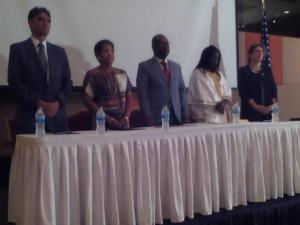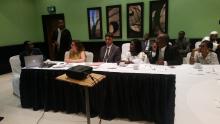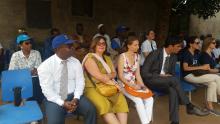Progress towards Malaria Elimination in The Gambia
An event to celebrate the advancements and achievements in Malaria reduction in The Gambia was held on the 11th of July 2017. Speaking at the celebration reception on behalf of the Regional Director for Africa, Dr. Matshidiso Moeti and, on behalf of the entire UN system working in the Gambia, Professor Jean-Marie Dangou, WHO Representative in the Gambia commended the Government, people of The Gambia, Ministry of Health and Social Welfare, National Malaria Control Programme, health workers and development partners for the extraordinary achievements. “We have come a long way in the fight against malaria in The Gambia. It is time to boost investments in malaria prevention and to support The Gambia to Eliminate and End Malaria for Good. With the required resources, and all partners united, we can transform our common vision into a shared reality” he said in his statement.
The Gambia has made considerable progress in the fight against malaria. The overall malaria parasite prevalence in the country is only 0.2% compared to 4% in 2011 indicating significant decline of more than 90 % in all the health regions of the country.
“We are very proud of the Gambia and I would like to reassure you that the World Health Organization will continue providing you with all the needed support to reach the malaria elimination target in the coming years.” He also commended among others, the Catholic Relief Services (CRS), Global Fund and the American Embassy in The Gambia for their contribution in funding the Malaria prevention strategies.
“Moving forward we must adopt and scale up new tools and strategies that have demonstrated effectiveness, have been recommended by WHO, and have been endorsed by government of The Gambia”, said Ms. C. Patricia Alsup , the U.S. Ambassador to The Gambia during her remarks. Also speaking at the event Annemarie Reily, CRS chief of staff and executive vice president of strategy and organizational development stressed the need to sustain the current achievements. "Now is not the time to stop or even slow our work".
“My government will continue to create the enabling environment and facilities for Gambia free of malaria scope," said the Minister of Health and Social Welfare speaking on behalf of His Excellency, President Adama Barrow.
During the breakfast meeting earlier in the day, the achievements, challenges and way forward were presented to a selected group of bilateral and multilateral partners by the program manager of the National Malaria Control Programme, Mr. Balla Kandeh. He highlighted the need to increase funding in order to sustain the gains already achieved and to accelerate progress towards Malaria elimination. Responding Prof Dangou reiterated WHO Country Office’s commitment to support the programme to develop an elimination strategy based on the new WHO Framework for Malaria Elimination and appealed for donors to boost investment for the Malaria Agenda in The Gambia.
The delegation later visited a community and health facility to assess the impact of the prevention tools distributed by CRS and MOH with support from the Global Fund.
In the Gambia, WHO works closely with the Ministry of Health and other partners to provide the technical and evidence-based direction for the fight against Malaria. The WHO Country office provided support to the Ministry of Health to adapt Global WHO recommendations and developed several policies and strategies applicable to the country context. Several National Malaria strategic plans developed with technical support from WHO have been successful implemented with funding from development partners and donor agencies.
In 2013, WHO provided support to the Ministry of Health to conduct a Malaria Programme Review in order to further refine the strategic plan to the country context and to refocus interventions to address the identified gaps and challenges. As a result, the National Malaria Strategic Plan was updated and Seasonal Malaria Chemoprophylaxis was included as another tool to the already existing strategies. With the support of CRS, the Global Fund and other partners, Seasonal Malaria Chemoprophylaxis was implemented with substantial decline in the incidence of malaria in children under 5.
As the prevalence of malaria decreases in the country, focus is on strengthening surveillance at all levels. In this regard WHO provided support to the programme during the Global Fund grant making process to include surveillance activities for Malaria.
Another important area that WHO supports the Malaria programme is in Therapeutic Efficacy Testing of the current antimalarial medicines used in the country. Rigorous monitoring to detect the early emergency of resistance is important to ensure efficacy of the malaria interventions.
WHO and Roll Back Malaria Partners have identified The Gambia as one of seven countries in the West African sub-region for accelerated progress towards Malaria Elimination. Progress is being made to establish a Regional Coordination Framework and to build a platform aimed at coordinating and providing technical support toward malaria elimination in these countries.


